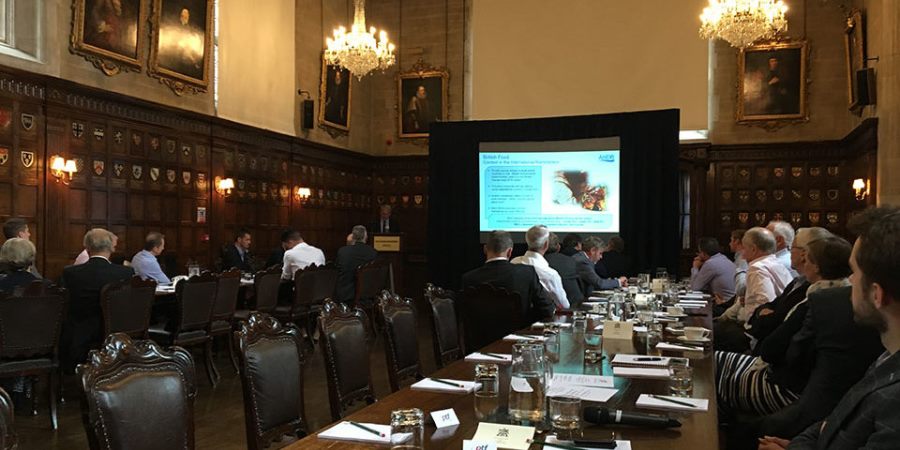The PTF’s AGM and seminar at Ironmongers’ Hall in London looked at the sustainability challenges facing the food industry in the light of pressures on natural resources from the impacts of climate change and biodiversity loss and of calls for people to reduce consumption of meat and dairy products.
Presentations were made by PTF’s director general, Andrew Kuyk CBE, Vicki Hird, farming campaign coordinator, for Sustain and AHDB’s chairman, Sir Peter Kendall.
Kuyk’s presentation emphasised that doing nothing about the many challenges facing us was not an option. He pointed out that there were, to begin with planetary limits. A key takeway for delegates was that: “If everyone in the world consumed at the level of the average person in Western Europe, we would need 3 planets to support us.”
He also pointed out that a seminal work was the Foresight report on the Future of Food and Farming, which explained that to feed 9 billion people in 2050 we would anyway have to produce more, from less and with less impact but climate change exacerbates that challenge.
Vicki Hird of Sustain gave a sombering and challenging insight into why sustainability matters and that climate change was a truly global emergency. Her top line solutions included the need to:
- Recognise the impact of intensive agriculture on climate, soils, water and biodiversity;
- Move fast to support rapid take up of agroecological and other forms of regenerative farming including rotational crop-livestock systems (Agriculture Bill);
- Ensure farmers receive a larger share of the income generated by the food chain;
- develop policies that ensure that everyone including the most disadvantaged can access nutritious food that enhances rather than undermines their health;
- need to build animal welfare standards that respond to our obligations to them as sentient beings.
The final presentation from Sir Peter Kendall looked at the challenges faced by the livestock industry. Sir Peter warned that: “Brexit has been a major distraction – but it is important we assess the consequences. He also emphasised:
- Industry is under the cosh – some deep seated trends, but also some more immediate challenges to our reputation with consumers
- How we’re perceived on three issues is might be significant for domestic outlook
- Health & nutrition
- Welfare
- Environment
- Demand from outside the UK likely to be more important to domestic industry
- What does all this mean for farmers and for you?
His answers included the need to:
- Tell your story – talk up the positives but be realistic & know your market
- Farm is ‘shop-window’ to consumer – make it look like it is
- Collective responsibility to adhere to high standards – only as strong as weakest link
- Be prepared to stand-by & prove sustainability outcomes – there’s patchy evidence to back up some claims we make eg on animal welfare
- Competitiveness in raw materials is a given – productivity growth the overriding priority
He concluded: “We have a collective responsibility that applies to all of us in acting as ambassadors for & with industry. We must be prepared to call out bad practice when we see it. Moy Park was a disappointing example that day. There was a need to look beyond efficiency – and industry must ask itself whether what you’re doing/ selling/ advising going to improve sustainability outcomes.”
He also said we must, as a country, compete – but be prepared to collaborate to help industry demonstrate its credentials where it can with data and evidence sharing.









